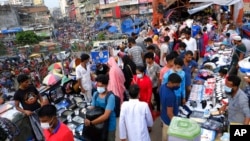Once hailed for its strides in economic growth and social advancement, Bangladesh now grapples with an uncertain trajectory as its faltering economy threatens to reverse hard-won gains in poverty alleviation.
Recent data from the national statistics agency reveals a stark reality: The economy is falling significantly short of expectations.
According to the Bangladesh Bureau of Statistics, the country's gross domestic product, or GDP, expanded by 3.78% in the second quarter of the current fiscal year, a notable decline from the 7% growth recorded in the corresponding period the prior year. With inflation hovering around 10%, the economic landscape appears bleak.
Industrial output grew 3.24%, which compared poorly with 10% growth in the same period last year. Similarly, the service sector grew 3.06% in the second quarter of fiscal 2024, less than half its growth rate a year ago. These two sectors together account for more than 80% of the economy.
Such sluggish performance has caused the International Monetary Fund, or IMF, to revise its forecast for the year to 5.7% – lowered from the 6% growth it had predicted for Bangladesh earlier.
Economists such as Debapriya Bhattacharya, distinguished fellow at the Center for Policy Dialogue in Dhaka, are concerned that low growth will mean fewer job opportunities and lower income, which would hit hardest the people who have the least.
"An increase in the number of people in poverty is a high possibility, and a deepening of inequality in income and consumption," Bhattacharya told VOA.
However, Bangladeshi Finance Minister Hasan Mahmood Ali has dismissed fears about the IMF revision, saying reforms undertaken by the government "are beginning to bear fruit."
Bangladesh made significant progress over the past decade, bringing down the poverty level from 41.5% in 2006 to 18.7% in 2022.
The economic slowdown has not come as a surprise to Bhattacharya, who said such figures could be predicted for some time.
"The main reason is, in order to have growth we need investment, and [to] allow the investors to import goods, but we are not able to do that because of lack of foreign currency."
Foreign currency reserves have come under pressure since the economy reopened after the COVID-19 pandemic. According to the central bank's figures, reserves declined from a high of $48 billion in August 2021 to below $20 billion in April 2024.
Bhattacharya said the high rate of inflation, which has affected people across the board, but particularly middle- and low-income groups, has seriously slowed demand and consumption. According to government figures, inflation in Bangladesh is currently running above 9%.
Economic analysts such as Mamun Rashid, however, believe the real figure is much higher. Currently the chairman at Financial Excellence Ltd., a private company, he recently retired as managing partner at Pricewaterhouse Coopers in Dhaka, and he earlier was managing director at Citibank N.A in Bangladesh, among other jobs.
Rashid said consumption in Bangladesh is driven by export earnings, inflow of remittances sent by migrant workers and money circulation. While exports and remittances have held steady, money circulation has been squeezed by the central bank's efforts to combat inflation by raising interest rates.
The veteran banker said corruption and weak regulation were key factors underpinning the foreign currency crisis, which has hit business hard.
"When there is a lot of money floating around from corruption or undocumented work, it fuels capital flight and reduces inward flow of dollars," he said.
According to Washington-based anti-corruption watchdog Global Financial Integrity, from 2004 to 2013, Bangladesh lost an average of $5.5 billion annually through illicit outflows. Bangladesh also does not receive all of its export receipts, as billions of dollars are siphoned off annually through trade misinvoicing.
Before the pandemic hit in early 2020, Bangladesh grew at an average of more than 6%, fueled by garment exports, agriculture and huge government investment in infrastructure such as bridges, roads and highways. The World Bank in 2021 called it "one of the great development stories."
The growth was achieved despite several structural flaws in the economy that are becoming more visible, according to Bhattacharya. The current government in its three successive terms in office (since 2009) has not increased private investment's share of the GDP. The private investment-to-GDP ratio has remained at 23% for 13 to 14 years. Foreign direct investment has remained below 2% of GDP.
Despite the problems, international development institutions such as the World Bank, IMF and the U.N. Development Program remain on board.
"They still believe in Bangladesh. That's why Bangladesh can count on around $10 billion worth of multilateral aid," Rashid said.
While Rashid is optimistic that export earnings and remittances from the 6 million Bangladeshis working abroad can increase and reignite the engine of growth, Bhattacharya says the current "growth narrative" is no longer sustainable without major reforms in the banking, financial and energy sectors.
"The time of reckoning has come," he said.
This story originated in VOA's Bangla Service.





